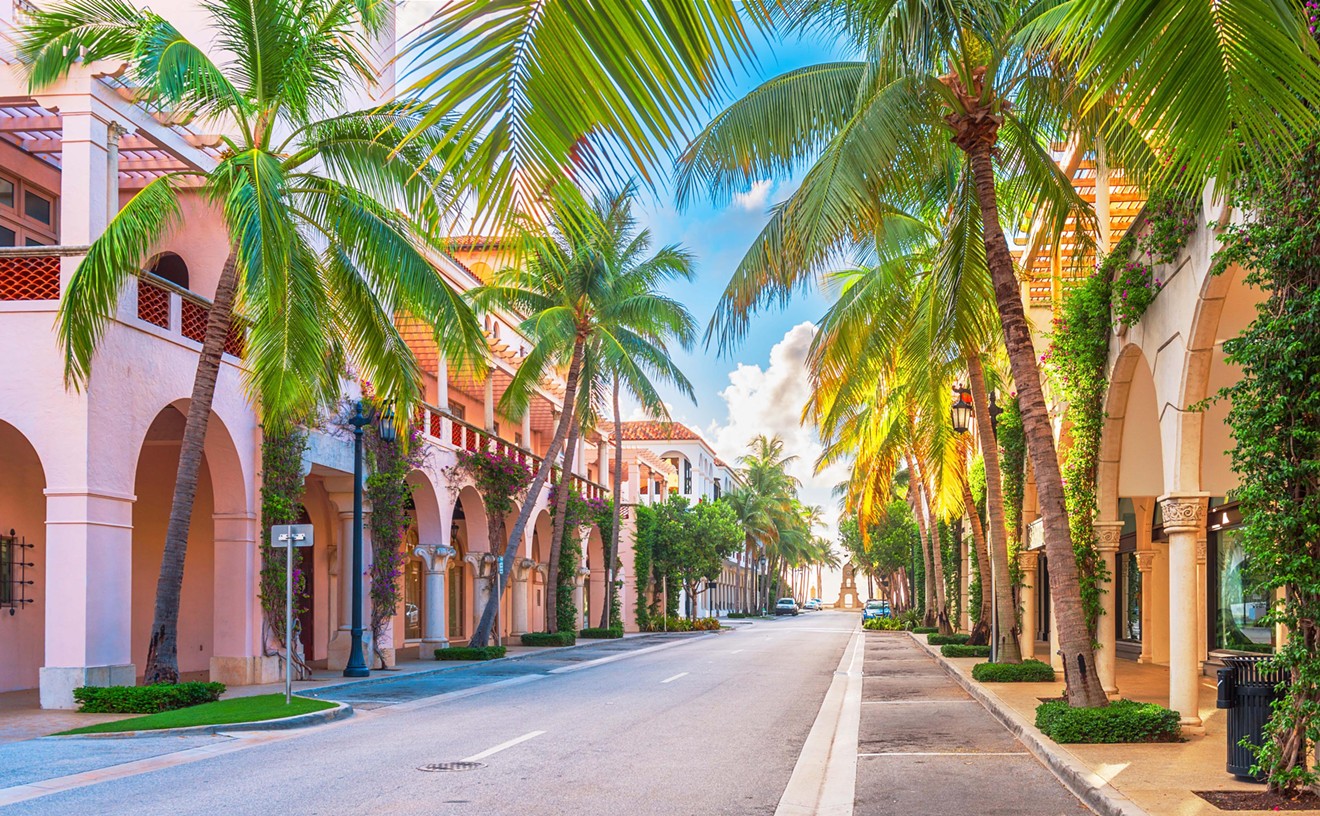It was another night in paradise. Or so it seemed to the thousands of souls streaming up and down Española Way like spawning salmon on April 24, 2013. South Beach's busiest block teemed with techno music and tourists. Hostesses in skimpy skirts flashed flirtatious smiles beneath glowing streetlights. Waiters with Euro-mullets ground black pepper atop overpriced meals. And inebriated couples snapped shaky selfies on their cell phones: #perfection.
To Antonio Halabi, however, something wasn't right. Española Way wasn't just busy; it was bursting at the seams. Since opening his restaurant, Flame Caffe & Grill, almost two years earlier, he had complained repeatedly that his competitors were cheating: choking the narrow thoroughfare with illegal tables and chairs. Now it was happening again. He dialed code compliance and sent an angry email to city officials. Then he waited.
Minutes later, three men marched up to the restaurant -- but they weren't code compliance officers.
See also: Miami Beach Fire Department Is Aflame With Corruption and Abuse
They were built like NFL linemen and dressed not in city uniforms but T-shirts, designer jeans, and white loafers. And they certainly didn't act like code officers. One of them, a husky man with a shaved head and half-sleeve tattoo, quickly cornered Halabi in his kitchen.
"You gotta stop complaining," the husky man said, waving a thick finger as his hulking buddies blocked Flame's doorway. "Everybody wants to be happy on this street. But since you came here, everything is crazy."
"It was a warning," Halabi remembers. "They didn't punch me or threaten to kill me, but I understood."
Halabi may have understood the message -- caught on his restaurant's security cameras -- but he didn't heed it. Two years later, he still hasn't shut up. His wife and son have fled the country in fear for their lives. But Halabi continues complaining of alleged corruption on Española Way: shady inspectors, broken rules, and a buddy system between city officials and local businessmen.
Halabi's accusations go beyond the usual grumbles of pay-to-play politics. His story involves a beautiful city employee moonlighting as a model, megadeveloper Scott Robins, and even Miami Beach's millionaire mayor, Philip Levine.
Levine did not respond to requests for comment. An attorney for Robins says the developer has done nothing wrong.
Halabi's one-man war has launched an FBI investigation and cost at least one city employee her job. But it also threatens to ruin his restaurant. And it remains to be seen whether he can change the city's culture or if he will be crushed like other whistleblowers before him.
"They have come to my restaurant. They have intimidated me. They have sued me," he says. "But I'm treated like the bad guy because I follow the rules."
Antonio Halabi's Miami Beach nightmare began as the archetypical American dream. Born and raised in the Venezuelan city of Valencia, he was an intense young man with a mind like a steel trap. At age 15, he was already helping his father finalize complex lease agreements. And despite studying medicine, Halabi decided to work for his dad's construction company. "I never liked being a doctor," he says. "I am more like an engineer."
Hugo Chávez swept into power in 1998, however, and Halabi soon began plotting his family's escape. As Chávez packed courts with political supporters and threw opponents into prison, Halabi saw the United States as a bastion of law and order. "I came here to save my family from what is happening in Venezuela," he says. "But what I found was the opposite."
Halabi moved his family to Aventura in 2011. He and his wife Cristina scouted South Beach for a spot to open a restaurant. They settled on the empty corner of Española Way and Drexel Avenue. Halabi says he spent more than half a million dollars renovating the place. "I converted a homeless place into the nicest kitchen in the area," he says.
Flame Caffe & Grill opened in August 2011. Soon he began to notice something odd. Few of his competitors on Española Way were abiding by the rules. He took particular issue with his next-door neighbor, a seafood grill called Kone. Every night, Kone employees would cover a wide swath of the street with seven or eight tables and up to 32 chairs. But when Halabi checked Kone's permits, he found the restaurant was allowed only eight chairs outside.
Halabi was outraged. He had paid nearly $30,000 for Flame's outdoor seating -- roughly $17,000 for the 48 chairs in a onetime fee plus another $12,000 annually for 600 square feet of street. But his neighbor was taking up almost the same amount of space for less than $4,000. Halabi estimated the city had been shorted thousands. And Kone's extra tables were also siphoning business from restaurants like Flame that had paid their permit fees.
Halabi sent an angry email to Corey Burton, a part-time model and Angela Bassett look-alike whose day job was overseeing the city's sidewalk café program. But Burton replied that Kone had expanded. "They were granted approval and paid all fees," she wrote. "The system should now be updated."
Sure enough, when Halabi checked online, Kone's permit had been changed to 32 seats -- but in just 37 square feet. "That's more or less the size of your bed," Halabi says. "So let me know how you are going to put 32 chairs in that space!" He complained again to Burton, and Kone's permit was once again mysteriously updated, this time to 80 square feet.
Halabi continued digging into city financial records and found that contrary to Burton's email, Kone had never paid for the extra 24 chairs. "I started going to higher and higher levels," he says. Many officials ignored him. Finally, one took him seriously.
January 25, 2013, Richard Lorber, head of the Planning Department, wrote Halabi that the records had been erroneously changed "without [Kone] being required to obtain Planning Dept. approval or pay... the fee."
(Marcelo Cordeiro, Kone's owner, calls Burton a "very nice lady" who "did nothing wrong." And he has bitter words for Halabi: "He's not even a man. He's probably a faggot or something. He sent his wife to take a picture and complain to code compliance.")
Halabi appeared to be making headway. Two months later, in March 2013, he received an unexpected phone call. Sgt. Osvaldo Ramos, a member of the FBI's Miami Area Public Corruption Task Force, invited him to FBI headquarters in North Miami. There, at the center of a labyrinth of metal detectors and security checks, Halabi laid out his ordeal.
Then Halabi sat down with city officials including then-Commissioner Jerry Libbin at city hall.
April 1, 2013, Burton was "relieved from duty" with pay "pending the conclusion of a disciplinary investigation." That probe was launched by the FBI, but Burton quit April 24, before it could be completed. Burton declined to address her resignation with New Times, saying only that it was "not a good idea... to discuss any code issues."
Neither Burton's resignation nor the FBI investigation has been reported. They are just the latest black eye for the beleaguered city. A year earlier, seven city employees -- including lead code enforcement official Jose Alberto -- were busted by the feds for demanding bribes from an Ocean Drive club in exchange for protection from fines and inspections. Around the same time, Miami Beach procurement director Gus Lopez was arrested for graft. Combined with these arrests, Burton's resignation gave Halabi hope. "I thought everything was going to be better after she left," he says.
Instead, the day Burton quit, Halabi poked his head out of Flame's front door and saw Española Way again clogged with unpermitted tables and chairs. Then came the threat from the three hulking heavies, which Halabi recorded on surveillance video.
"They thought I'd be scared," he says. "But it just made me more angry."
Halabi's wife Cristina wanted to get the hell out of Miami Beach. She pulled their son out of school and took him to Venezuela, calculating that even a country with a kidnapping epidemic was safer than South Beach. But Halabi stayed, emailing his landlord, Scott Robins, to complain.
Robins is one of Miami Beach's most powerful property owners and developers. His stepfather, Gerald Robins, was an early Miami real-estate mogul, and his stepbrother Craig is the genius behind Miami's Design District.
Halabi got a curt response from Scott Robins' office. "I would suggest that you curb your attempts at doing Code Enforcement's job," wrote Robert Alexander, general manager of Robins' properties. "You are the newest restaurant on the block with many established operators, and you have alienated your neighbors."
But Halabi again chose confrontation. While investigating illegal signs along Española Way, he discovered that his upstairs neighbor, a 12-room boutique hotel called Española Way Suites and registered to Robins, wasn't properly licensed. "The hotel didn't have a BTR," or business tax receipt, required to operate, Halabi says. "They renovated it without permits. My concern is that they are running a hotel above our heads. I'm worried that my customers are in danger."
City records show that when Robins applied for a license in 2011, it was denied. Yet posts on TripAdvisor's website suggest the hotel has been operating anyway.
"It took more than a month for the city to issue a citation," Halabi says. This past December 1, Robins applied again for a license. And January 15, 2015, the city's special master gave him extra time to sort out the permitting.
Halabi claims Robins receives special treatment because of his many connections -- particularly to Mayor Levine. "They don't care because they are friends," he says of Miami Beach's two most powerful men.
In fact, Robins and Levine are more than close friends: They are also business partners. Together, they own at least four properties -- including a 33,000-square-foot commercial center housing Panther Coffee in Sunset Harbour.
But Dennis Richard, Robins' attorney, says his client has no outsize influence on the city.
"Mr. Levine's one year in office has had no effect on Mr. Robins' 25 years of respected business activity in the city," says Richard, adding that Robins was not a target and "knows nothing" of the FBI investigation. "Mr. Robins has been a responsible citizen of Miami Beach all of his life. His personal and business reputations are unblemished."
Halabi's complaints, meanwhile, have only worsened his headache. Robins has sued to evict him for failing to open for lunch and for "annoyance of other tenants." If Halabi loses the legal battle, he says, he could be out around $1 million. He might also give up on his American dream and return to Venezuela for good.
"We never imagined it would turn out like this when we moved here," Halabi says. "When I leave Miami Beach, I will never go back again. Even if a viper bites me and I need to go across the bridge for the antidote, I'd rather die than go back."
Send your tips to the author, or follow him on Twitter @MikeMillerMiami.
Follow Miami New Times on Facebook.











